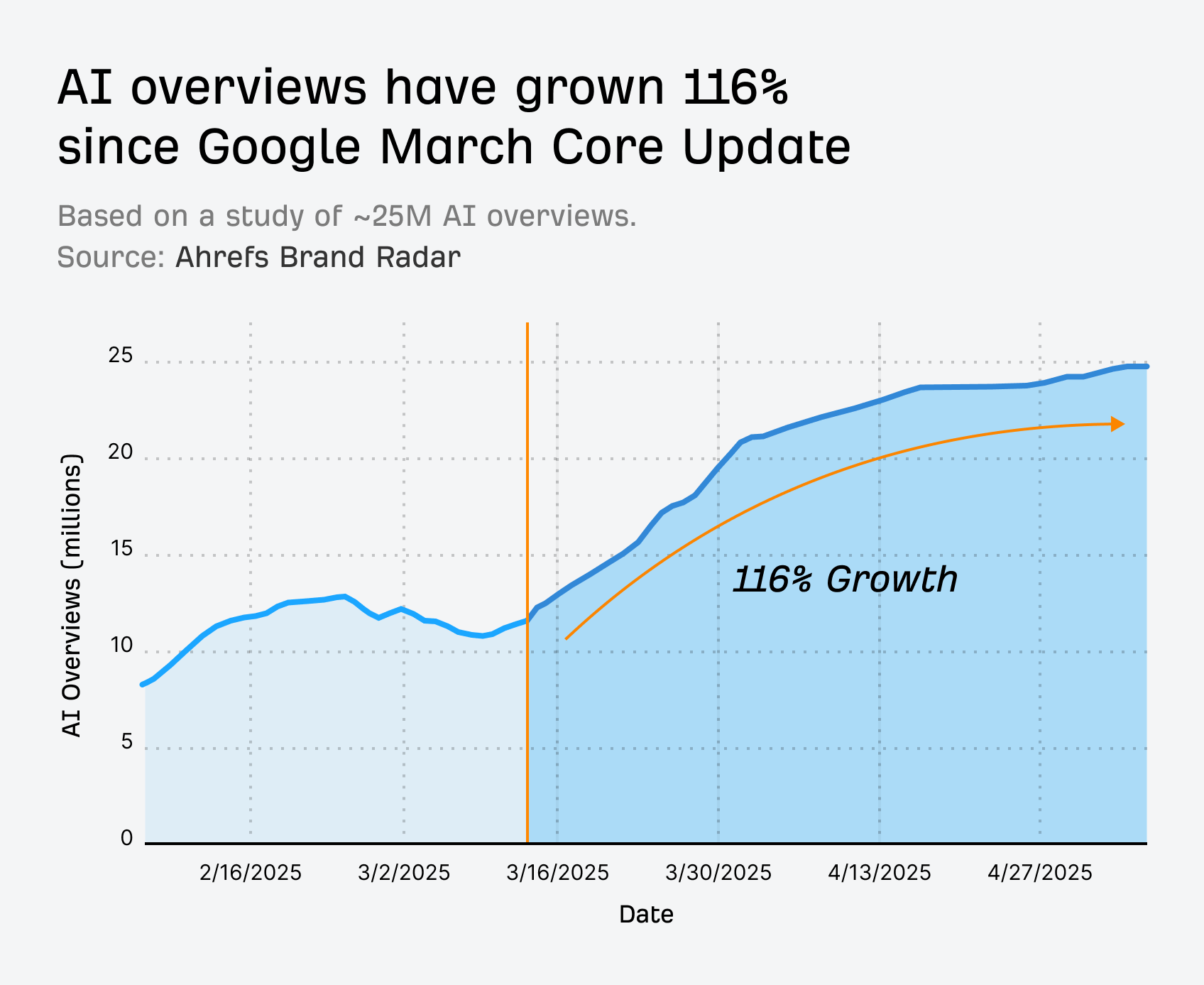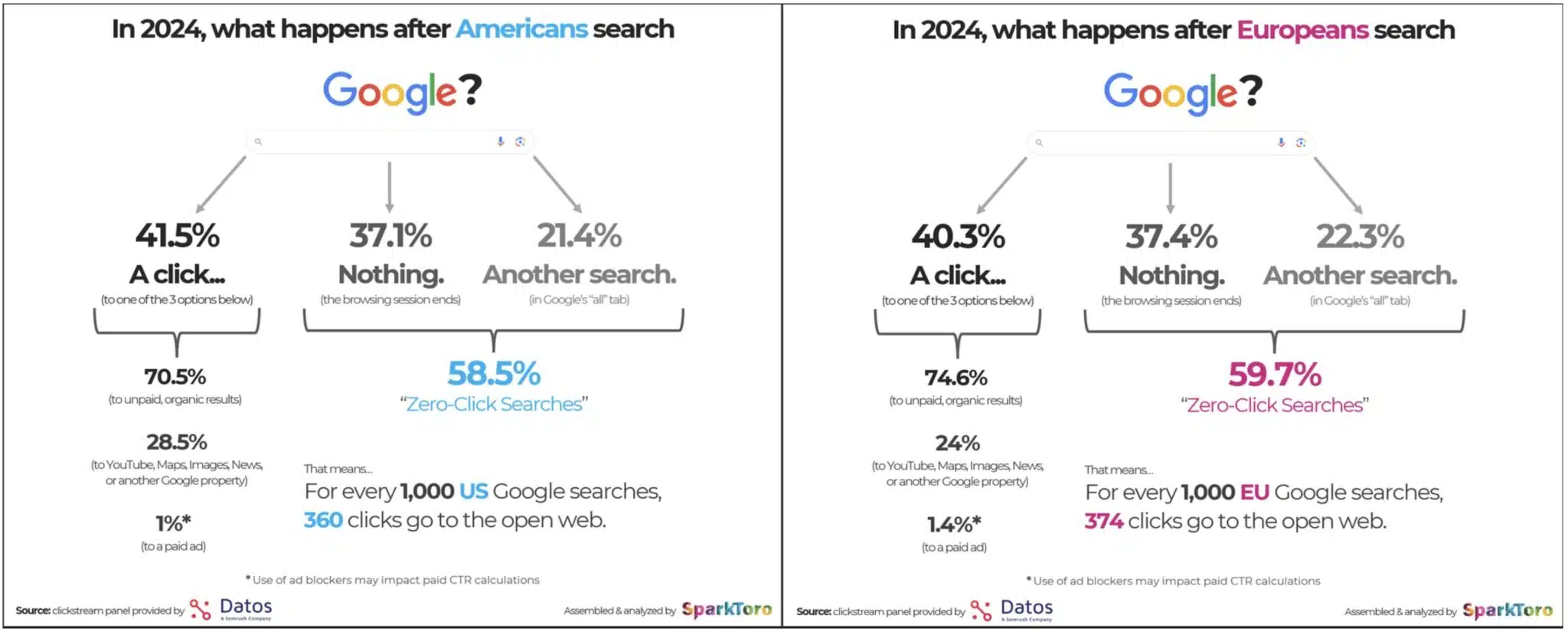

What is the role of SEO in an AI-dominated world?
In Cloud Atlas (2012), based on the novel by David Mitchell, a member of an upper class circle in the San Francisco of 1849 is confronted by his father-in-law because he and his wife have decided to abandon the high society life of their family and travel east to join the growing abolitionist movement. The father-in-law, played by a villainous Hugo Weaving, threatens, “No matter what you do, it will never amount to anything more than a single drop in a limitless ocean.”
The man, portrayed by a resolute Jim Sturgess, replies – “What is an ocean but a multitude of drops?”
This scene comes to my mind often when working with AI, especially when I find myself wondering what our lives will be like as AI advances. In a world increasingly dominated by artificial intelligence, it’s easy to feel like nothing more than a drop in an ocean. AI is unfamiliar, yet continues to be integrated into the fabric of society at breakneck speed.
Search engines are no exception. In fact, due to the prominence of search engines in the everyday lives of the general public (Google alone processes an estimated 8.5 billion searches daily), they may represent the most significant AI presence in many people’s lives – at least, for the time being. In recent months, search engines have been rapidly evolving to incorporate AI into search results. AI is being used to augment classic blue link results, often summarizing information so that users don’t need to visit a website in order to get the answers they’re seeking. Presently, these features are optional and mostly secondary to traditional searches. Soon, AI searches will not be secondary. They will not be optional. They will be the default.

While there are myriad opinions on the efficacy of AI search results, two things are irrefutable:
- More people are utilizing AI search results, including AI overviews.
- AI search results are rapidly improving at delivering results that are accurate and match the intent of the searcher’s query.
The growing integration and adoption of AI isn’t going to stop. Our job as search specialists is to adapt and figure out how we are going to help clients continue to succeed in an internet environment powered by AI.
The rise of the zero-click search
A zero-click search is any search where the user fulfills their search need without clicking to a website. For instance, if a user searches “what temperature should my fridge be” and gets their answer from the AI Overview at the top of the search results without clicking any of the sources or links below – that is a zero-click search.
As AI search results become more prevalent, the percent of searches that are zero-click continue to increase. This is because AI searches aim to summarize information rather than point users to the source of that information.
Zero-click searches first became a concern when Google added features like the local map pack, featured snippets, and other search enhancements. These features often negated the need for users to click on a website result, which in turn diminished traffic to those websites.
These searches have become exponentially more prevalent as more users adopt AI search. In 2024, almost 60% of Google searches ended without a click. Without a doubt, this number will continue to rise as AI Overviews encompass more search queries and AI Mode is rolled out across the globe.

This change in user behavior has more or less ended the existence of search marketing as a tactic for traffic growth. It has also made many searches, primarily high-level informational searches, defunct. These simplistic searches will almost inevitably end without a click thanks to AI Overviews or AI searches.
What does this mean for SEO?
Contrary to all the clickbait headlines and YouTube videos you have doubtlessly encountered, SEO is not dead. AI represents the next evolution in search and will require search experts to adapt their strategies to the new search environment. While priorities will shift and metrics measured will change, SEO remains alive and as important as ever for success on the open web.
There are a few key ways that SEO will evolve over the coming months:
SEO will shift towards being a brand channel
SEO has always had a brand component, but as it becomes less about measuring clicks and ranks and more about brand relevance and authority, we will need to shift our mindset towards what SEO is and what purpose it serves for a brand (long-term impact with limited measurement capabilities).
More focus on high-intent keywords
Clicks from AI Overviews and AI search engines have lower volume, but higher conversion rates. By optimizing towards highly qualified keywords (bottom of funnel vs. top of funnel), we can ensure that these users are experiencing excellent UX and getting the information they need to convert.
Changing metrics for tracking success
Organic traffic is no longer a viable metric to measure the success of an SEO strategy. As mentioned previously, the hyper-customized nature of AI search will make it difficult to track any metrics with certainty. For now, we will continue to track keyword rankings (though this may soon be obsolete) as well as search visibility, which shows the percentage of search results owned across a brand’s entire keyword portfolio. As SEO tools continue to evolve, new ways of tracking AI search result placements are likely to emerge.
SEO is an omni-channel function
Optimizing your website is no longer enough. Generative engines synthesize information from across the entirety of the internet, including social media and public forums such as Reddit. SEO is now a key player in ensuring that a brand is maintaining authority, trust, and relevance in all corners of the web.
Adapting to AI searches
The key to success with AI search is not to resist AI but to work with it, shaping strategies that join traditional SEO best practices with new priorities that align with how algorithms now surface, summarize, and deliver information. Here’s where to start:
Prioritize structured, machine-readable content
AI-driven search thrives on clarity. Schema markup, structured data, and clean site architecture are foundational to success in search. Content that’s easy for AI systems to parse has a higher chance of being surfaced, cited, and trusted in generative summaries.
Optimize for answer engines, not just search engines
With Google’s AI Overviews and tools like Perplexity or ChatGPT Search, users increasingly interact with “answer engines.” To stay visible, craft content that directly addresses questions, provides concise summaries, and organizes insights into digestible formats (lists, FAQs, bullet points). The clearer your answers, the more likely AI will pull (and source) your content.
Emphasize human creativity
AI is excellent at aggregation, but it lacks voice, perspective, and lived experience. This is where SEO practitioners can differentiate. Layer your expertise, anecdotes, and unique interpretations on top of the data. Content with a recognizable voice and authentic perspective won’t just rank better, it will resonate with readers who are drowning in a sea of generic AI text.
Maintain technical excellence
Fast-loading, mobile-friendly, secure websites remain the bedrock of SEO. AI may influence how users discover your content, but poor technical performance still drives them away. Site speed, accessibility, and intuitive navigation ensure the human experience matches the quality of your AI-optimized content.
Diversify beyond traditional search
SEO no longer lives in isolation. With AI reshaping search behaviors, brands must diversify their presence across ecosystems – social platforms, video, podcasts, and even branded communities. This creates multiple touchpoints where users can encounter your content, reducing dependency on search engines alone.
Monitor and adapt constantly
AI-driven search is evolving faster than any previous algorithm update. Search experts must build flexibility into their strategies – monitor traffic shifts, test new formats, and adapt content as search interfaces evolve. In this environment, agility is just as valuable as authority.

The tide is rising
As AI reshapes the digital landscape, it’s easy to feel dwarfed. A single drop in a limitless ocean of machine-generated answers. But just as in Cloud Atlas, that ocean is nothing without its multitude of drops. Each piece of thoughtful, human-crafted content contributes to the larger tide of knowledge that AI draws upon.
The role of SEO in an AI-dominated world isn’t disappearing – it’s evolving. Where once the task was to optimize solely for algorithms, now it’s about optimizing for a dual audience: intelligent systems that process and deliver information, and the humans whose trust and attention remain the ultimate goal.
For search experts, the path is shrouded but there is a light at the end – create content that machines can parse, but only humans can truly connect with. Leverage structure and clarity to ensure AI sees you, but layer in voice, perspective, and creativity so your readers feel you.
So the question isn’t whether SEO has a role in an AI-first search world. The question is: how will your drop shape the ocean?



.jpg)

.gif)
